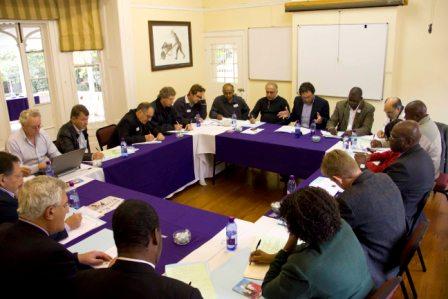
South African Humanities Deans’ Association (SAHUDA) met last week at Rhodes University to discuss the future of the humanities in South Africa. Discussion ranged from calls for a liberal arts renaissance in higher education, to self-critical examinations of the shortcomings in humanities programmes. Underlying the discourse was the belief that these disciplines function as the essential vehicles for transformation and development in society.
This conversation takes place against a backdrop of a recent government initiative to prioritise the humanities in South Africa. Minister of Higher Education and Training, Dr Blade Nzimande, commissioned the Charter for Humanities and Social Sciences earlier this year – a document which will provide recommendations to government on how to revitalize liberal arts programmes in South African universities.?
Opening the debate was Vice-Chancellor, Dr Saleem Badat, who questioned the use of such fatalist terminology as ‘decline’ and ‘crisis’ when referring to the current situation. “bbin宝盈集团 like these are relative terms,” said Dr Badat, “perhaps the concern is what we’re doing in the university with the humanities.”
Dr Badat called for a greater degree of introspection from the key players, asking the association to consider whether this new push for the humanities isn’t inspired by a nostalgic longing for the “flowering political economy work in the early 80s.” He was hopeful though reticent about Minister Nzimande’s initiative to support the humanities, “We welcome this opportunity he has provided,” said Dr Badat, “but securing budget for these things takes time”.
Though economic support was highlighted as an important aspect of developing the humanities, many cautioned against viewing funding as the singular barrier to prosperity. Echoing Dr Badat, Prof Premesh Lalu, Director of the Centre of Humanities Research at the University of the Western Cape, expressed scepticism about such debates. Prof Lalu argued that the greater focus should be given to the content and curriculum of humanities programmes and to challenging conventional views of the university in Africa, which have narrowly conceived them as “places that operate case studies”. Prof Lalu also encouraged the deans to challenge the “narrative of decline”, asking them to move beyond a mere defence of the humanities. “I’m calling for a degree of critique of the very disciplinary forms that have developed the humanities in Africa,” he said.
But the recurrent theme of anxiety did not go un-discussed. Prof Peter Vale, Co-Chair of The Academy of Science of South Africa Consensus Panel of the Humanities (ASSAf), offered a sobering analysis. The panel, which was created to assess the status, prospects and strategies of the humanities in South Africa, will deliver its report in the coming months. Prof Vale discussed the panel’s major findings thus far, reiterating the decline in government funding for arts and humanities programmes as well as the government’s disproportionate emphasis on the sciences post-apartheid. His statements did not go unchallenged, however. Prof Paula Ensor, Dean of Humanities from UCT, questioned the evidence the panel used to draw this conclusion that “the humanities is in a state of intellectual stagnation.”
Shedding further light on the situation was the Director of the Charter for Humanities and Social Sciences’ ministerial task team, Dr Ari Sitas of UCT. “The biggest killing fields are in first year,” said Dr Sitas, “this is where we get nightmare scenarios of student to lecture ratios…it can’t go on like this.”
Regardless of whether the current climate of the humanities is as dull as it has been rendered, the coming months will be crucial to bolstering their broad based support. As both the charter and the consensus panel compile information and solutions to bring to government, it is critical that those charged with representing the humanities in South Africa continue their open deliberation. “Unless we have this conversation ourselves, with scientists and in the public,” said Prof Vale, “I think we’re going to remain in the margins even if we successfully reform our system – if that’s our goal.”
Story and picture by Hailey Gaunt

